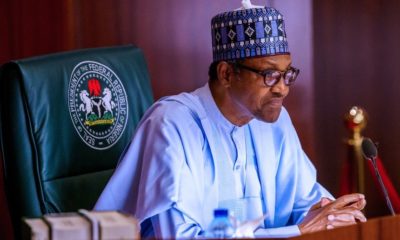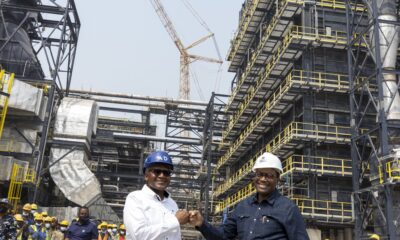President Muhammadu Buhari on Wednesday in Abuja said Nigeria lost an estimated $50 billion worth of investments in ten years, caused by non-passage of the Petroleum Industry Bill (PIB), lack of progress, and stagnation in the petroleum industry.
Speaking at a ceremony on passage and signing of the PIA, which preceded the Federal Executive Council (FEC) meeting, the President said the stagnation affected the growth of the economy.
He also cited the lack of political will on the part of past administrations to actualize the needed transformation in the oil and gas sector.
President Buhari said assent of the Petroleum Industry Bill on August 16, 2021, marks the end of decades of uncertainty and under-investment in the petroleum industry.
“We are all aware that past Administrations have identified the need to further align the industry for global competitiveness, but there was a lack of political will to actualize this needed transformation.
“This lack of progress has stagnated the growth of the industry and the prosperity of our economy. In the past ten years, Nigeria has lost an estimated $50 billion worth of investments due to uncertainty created by the non-passage of the PIB.
“This administration believes that the timely passage of the Petroleum Industry Bill will help our country attract investments across the oil and gas value chain.
“In view of the value our Nation and investors will derive from a stable fiscal framework for the oil and gas industry, our Administration has found it necessary to work with the two chambers of the National Assembly to ensure the passage of the PIB,” he said.
President Buhari noted that the signing of the bill was part of the administration’s commitment to building a competitive and resilient petroleum industry that will attract investment, improve our revenue base, create jobs and support our economic diversification agenda.
The President said as a “nation that depends on oil resources for the development of other sectors, Nigeria runs a Petroleum Industry that is governed largely by laws enacted over 50 years ago such as the principal legislation; the Petroleum Act of 1969 and other obsolete legislations.”
He said the Presidential assent of the bill to “Petroleum Industry Act 2021” marked the beginning of the journey towards a competitive and resilient petroleum industry that will attract investments to support the nation’s Economic Recovery and Growth Plan.
“The “Petroleum Industry Act 2021” creates a regulatory environment that would ensure efficiency and accountability across the oil and gas value chain and reposition NNPC to a commercially driven National Petroleum Company that is accountable to the Federation.
“The Act also provides for a direct benefit framework that will enable the sustainable development of Host Communities. I appeal to the host communities to look carefully at the contents of the Bill which in the implementation will bring real and lasting benefits to them.
“Furthermore, the Act provides for a deliberate end to gas flaring which would facilitate the attainment of Nigeria’s Nationally Determined Contributions of the Paris Agreement through a funding mechanism to support gas flare out project in host communities,’’ he added.
President Buhari said the administration believes that the timely passage of the Petroleum Industry Bill will help our country attract investments across the oil and gas value chain.
While directing the immediate implementation of the framework for the Petroleum Industry Act (PIA), he urged all relevant stakeholders to comply and reposition for full activation within 12 months.
The President appoints Minister of State for Petroleum Resources, Timipre Sylva, to head the implementation team, urging all Ministries, Departments and Agencies (MDA) to adjust to the transition, designed to reposition the economy.
“To consolidate the commitment of this administration to delivering the value proposition of this law, I have approved an implementation framework commencing immediately to ensure the industry envisaged in the new law begins to take shape.
“The implementation process to be headed by the Hon Minister of State, Petroleum Resources is hereby tasked with the completion of the implementation of this act within 12 months.
“I am therefore directing all relevant Ministries, Departments and Agencies of government to fully cooperate in ensuring the successful and timely implementation of this law,’’ he said.
President Buhari commended the leadership of the 9th Assembly for their continued pursuit of national aspiration and demonstration of mutual harmony with the Executive in the pursuit of patriotic outcome in the passage of PIB.
“I also commend the entire team in the executive that worked tirelessly to ensure the delivery of this strategic legislation for our country. I thank Nigerians and other industry stakeholders for their contributions and support in achieving this historic landmark,’’ he said.
The ceremony was attended by the Senate President, Ahmed Lawan, Deputy Senate President, Ovie Omo-Agege, Deputy Speaker Hon. Ahmed Idris Wase and other lawmakers, members of the Federal Executive Council (FEC) and Group Managing Director of the NNPC, Mele Kyari.

 Billionaire Watch3 weeks ago
Billionaire Watch3 weeks ago
 Startups4 weeks ago
Startups4 weeks ago
 News4 weeks ago
News4 weeks ago
 News4 weeks ago
News4 weeks ago
 Bitcoin4 weeks ago
Bitcoin4 weeks ago
 Naira4 weeks ago
Naira4 weeks ago
 Forex3 weeks ago
Forex3 weeks ago
 Treasury Bills4 weeks ago
Treasury Bills4 weeks ago

























